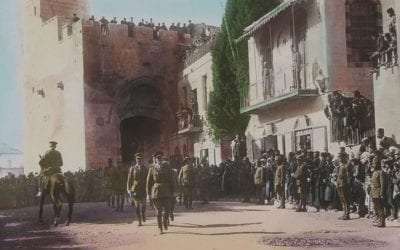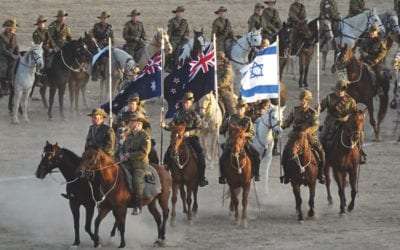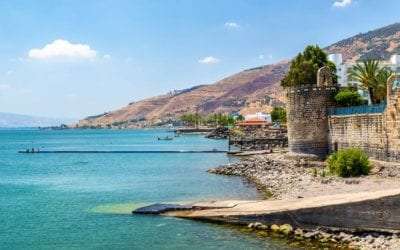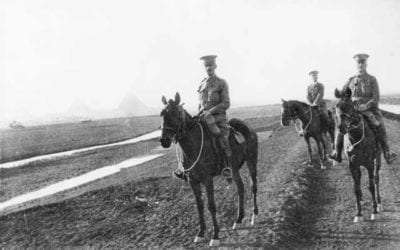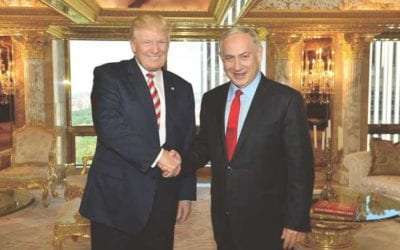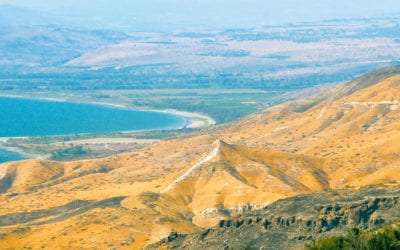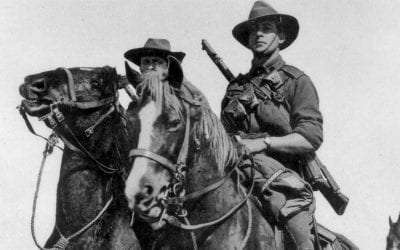On December 11, 1917, Gen. Edmund Allenby’s forces officially liberated Jerusalem. Actually, a Jerusalem delegation, led by the mayor, surrendered the city to a pair of British army cooks on December 8. Thus began a comical farce. The Turkish army and its German commanders had fled the city ahead of the British advance, leaving the city officials nervously waiting for the liberators. The first uniformed men to arrive were privates Andrews and Church, two cooks who got lost while searching for cooking water. They wandered near the Jaffa Gate entrance to the Old City and were confronted by a large delegation of city officials. The cooks were so scared they ran back to their unit. At 8 a.m. the following morning, James Sedgewick and Fred Hurcomb, two British sergeants, were scouting around the Old City walls when they were approached by a group of Arab dignitaries holding a white flag. The two soldiers were overwhelmed by the sudden responsibility of accepting the surrender of Jerusalem and apologized after pictures were taken for posterity, saying they were unable to accept the surrender but promised to send a more senior officer. Later the same day, two artillery officers, majors Beck and Barry […]
WWI
The charge of Beersheba reenactment aftermath
The centenary of the charge of Beersheba created enormous interest in Israel. I estimate some many millions of shekels were spent on preparation for the event. With grandstands, field preparations, streets adorned with banners and flags of Australia, New Zealand and Israel, not to mention the enormous cost of security with the Prime Ministers of Australia and Israel and countless VIP’s present. While on the subject of flags, we did get some criticism from the ABC Insiders program, surprise, surprise, for carrying the Israeli flag during our ride. However we carried the Israeli flag with pride, out of respect for our host Nation and its great support for our event. In addition, it symbolised something of the special relationship between our two nations and our unique shared history. I must say though other ABC coverage was excellent. Our journey was publicised as a “ride for peace” and our tour “in the steps of the Light Horse” took us through the length and breadth of Israel. We had a contingent of Kiwis with us and acknowledged their role in the battle for Jaffa at Ayun Kara and Tel El Saba. Peace for Israel means security and we must stand with all […]
The City of Tiberias
Tiberias is a city in Israel located on the banks of the Sea of Galilee. The Sea of Galilee is locally called Lake Kinneret, but we mostly know it as the Sea of Galilee. Our Israeli guide calls Tiberias, Tiberiah, which has a lovely Israeli lilt to it. The city itself was first established about 20BC and was named to honour the Roman Emperor Tiberias and the original city was actually located just a little further along the shores than the current modern city of Tiberias…however when I say the modern city, it’s still ancient. The city has natural hot springs which were known to help cure skin and other ailments and today it’s quite a bustling city, although it’s really very old. What is very characteristic of the buildings in Tiberias is the common use of black basalt stone. Most of the tourist hotels are situated along the shores of Tiberias which is really quite lovely when you wake up each morning to look out your window and see the sun rising over the lake. The history of Tiberias… is crucial in the unfolding of God’s plans for this land. There is quite a large orthodox community in Tiberias, […]
31 October – Destiny’s Date? (Part 2)
World War One & the German-Turkish alliance When War broke out in August 1914 Germany and Ottoman Turkey had already entered into a secret agreement. Britain was now reluctantly forced into conflict against the Turks. The area of greatest strategic and military importance was the Suez Canal. Everything needed to be done to preserve the link to the eastern empire. Indeed already at that stage strategists were looking to the post-War period, and what would be best for Britain and this link. One Jewish parliamentarian, Herbert Samuel proposed in 1914-5 that Britain should take control over ‘Palestine’ and permit the establishment there of a Jewish national entity. From March 1915 a two-fold movement began which climaxed on 31 October 1917. The first was military, and began on the shores of Gallipoli. This campaign ended in failure, and resulted in Turkey planning for the capture of the Suez Canal. Britain’s goal was to protect the Canal, and the most effective method was by creating a buffer zone up to the Sinai-Palestine border. The second movement was political, and resulted from a Russian demand in March 1915 that following victory at Gallipoli and once Constantinople fell, then Russia would gain the region […]
Australia and Israel: For such a time as this
The contemptible UNESCO resolutions concerning Jerusalem’s Temple Mount and the burial grounds of Israel’s founding fathers in Hebron have shown again how fierce and unrelenting the effort is to delegitimise Israel by disputing or seeking to sever its ancient roots in—and millennia-long ties to—this land. That such international positions are taken against the Jews’ indigeneity is appalling enough. What defies belief is that Judea-Christian nations (like Australia and Israel and America for example) whose cornerstone is the same Bible that authenticates Israel’s claims to its land, to Jerusalem and to the Temple Mount have not rallied to stand with Israel against this assault on the origin of all Christians and Jews. Can Australia be different? Foreign Minister Julie Bishop describes her nation’s relationship with Israel as warm and close. Aussies hardly need me to note that there is so much more that has gone into this mateship than just diplomacy and co-operation. An enormous amount of Australian blood was shed to help liberate the Jews’ historical homeland in World War I, and to keep the Nazis from reaching this land and killing its Jews in World War II. Ties have continued to deepen between the two countries and, during the tenure […]
100th Anniversary of the Australian Light Horse – Coming October 2017
In 2007 the Australian Light Horse Assn (ALHA) conducted the highly successful and much publicised “In the steps of the Light Horse” re-enactment tour for the 90th anniversary of the charge of Beersheba. This tour brought to public attention the significance of the Middle Eastern Campaign in WW1, an often forgotten campaign that has been overshadowed by Gallipoli and the Western Front. During this tour we visited the old battle scarred railway station at Semakh. In WW1 Semakh was a quaint little fishing village located on the shores of the picturesque Sea of Galilee. Our guide, the well known Australian author and historian, Kelvin Crombie, pointed out the historical significance of the battle that took place here at this vital railway junction on the 25th of September 1918. The following brief account of the vital nature of this battle and its significance in hastening the end of WW1 is outlined by a Kinneret College historian; “In the autumn of 1918 the British forces under General Allenby started their northern offensive against the Turkish forces under Liman Von Sanders. The Semakh station was an important gateway on the way to the whole of the Galilee and the road to Damascus. Australian […]
Anzacs, Israel & Australia’s destiny – a need for balance
Photo of Anzacs from AWM: “Australian light horsemen riding waler horses. The soldiers are of the original contingent of the Australian Imperial Force and the photo was taken prior to their departure from Australia in November 1914. The soldier on the right is Trooper William Harry Rankin Woods, 1st Light Horse Regiment, who died of wounds on 15 May 1915, one of the first light horsemen to die during the Battle of Gallipoli.” I recently re-read an article I wrote in 1992 entitled ‘The Anzacs and Israel’ which had been published in several Christian magazines and circulated around Australia and New Zealand. It portrayed a somewhat patriotic ANZAC perspective – which I now realise was not entirely balanced. At that time I was working as a local guide at Christ Church in the Old City of Jerusalem specialising in British, European and Protestant involvement in the Eastern Mediterranean 1798-1948. This article reflected my attempt to present the significant contribution which ANZAC soldiers had played in helping to lay the foundations for the establishment of Israel – as part of the bigger geo-political picture. This perspective was aided through also conducting In Step with Allenby and the Light Horse tours from Jerusalem, down […]

